Although Michelle Yeoh has had many occasions this award season to grow used to ovations — many of them standing — she received her final one of the season walking into the media interview room at the Dolby after winning her Best Actress Oscar, and that one, apparently, took her by surprise.
“That was quite a welcome!” she said. “Are you sure you’re press?”
But indeed we were. After all, the majority of us weren’t invited to the Governors’ Ball afterward.
Questions for Yeoh then followed, coming not just from that room, but all over: In a welcome pandemic-era change the Academy is apparently keeping, there is now also a virtual press room, so those all over the globe can cover these proceedings, too. It provides an even more international flair to the evening, even with an already diverse media pool present, and even in an era where there’s some question about whether “The Oscars” still play to collective aspirations — or id — to the degree they did when the ceremony was destination TV on the level of the Super Bowl.
The Academy’s “room runners” alternate between “actual” and “virtual” press rooms when taking questions, though there were more to be found on-site this year than last, as this was the first full retinue of interview room attendees since things started going “viral,” in the catastrophic sense, three years ago (last year there was “limited attendance.”)
One question for Yeoh asked for a reflection on the journey both she and Everything Everywhere All At Once had taken this season ever since its debut at Austin’s SXSW Film Festival last year, all the way to its Best Picture win at the Dolby. She reflected that had been the first time people were able to watch the film on a screen. “Why do we make movies?” she reflected. “For the cinema [where] we want a collective experience where we want to enjoy [and] share that laughter, crying, or whatever it is, together. That is what the magic of being at the movies [is]. At SXSW, it was the first actual [screening] ‑‑ not streaming, not virtual.”
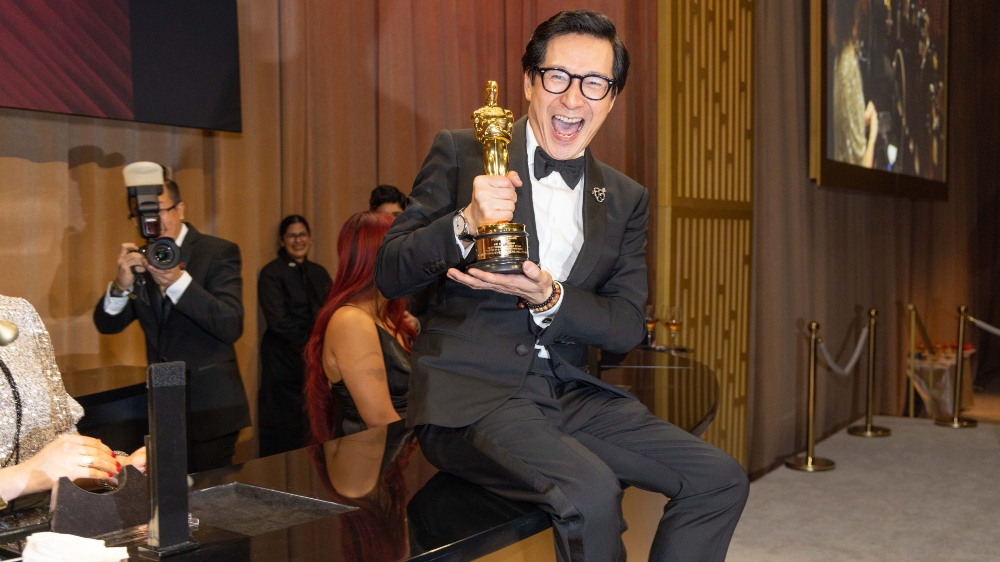
And to be sure, there was a relentless insistence throughout the evening, from host Jimmy Kimmel‘s opening remarks onward, that the movie-going experience as we have known it was unassailably back — just look at those box office numbers for Avatar: The Way of Water, Top Gun: Maverick, and yes, EEAAO!
And while those are all impressive numbers, whether theaters are “back” — as AMC’s stock price remains lower as of this writing — or whether they’re going to become like vinyl and printed books and continue to occupy a niche of a rapidly shifting entertainment and cultural ecosystem, all remains to be seen. We still, thankfully, have bookstores, for example, but that doesn’t mean publishing hasn’t fundamentally changed. And this year, every single Best Picture nominee after, with the exception of Avatar, was streaming and/or rentable online by the time the Oscars rolled around.
Netflix had a good awards night too, second only to A24, winning Oscars for Guillermo del Toro’s Pinocchio, and, of course, All Quiet on the Western Front, which took home the Best International Feature prize for Germany.
Indeed, All Quiet began its own accumulation of awards while del Toro was backstage praising Mexico’s blooming stop-motion animation scene while relating a rather horrific anecdote about Guillermo Navarro, the Cinematographer who won an Oscar for Pan’s Labyrinth. Navarro later approached an agent who said to him, “‘Why do I want a Mexican? I have a gardener.'” To the gasps around the room, del Toro continued that in the film biz there “was a lot of open and subtle racism ‑‑ and there is [still] a glass ceiling. There is. And you have to keep pushing it all the time. It doesn’t end with one generation. It doesn’t end with one person. Again, together, you push that limit more and more and create opportunity.”
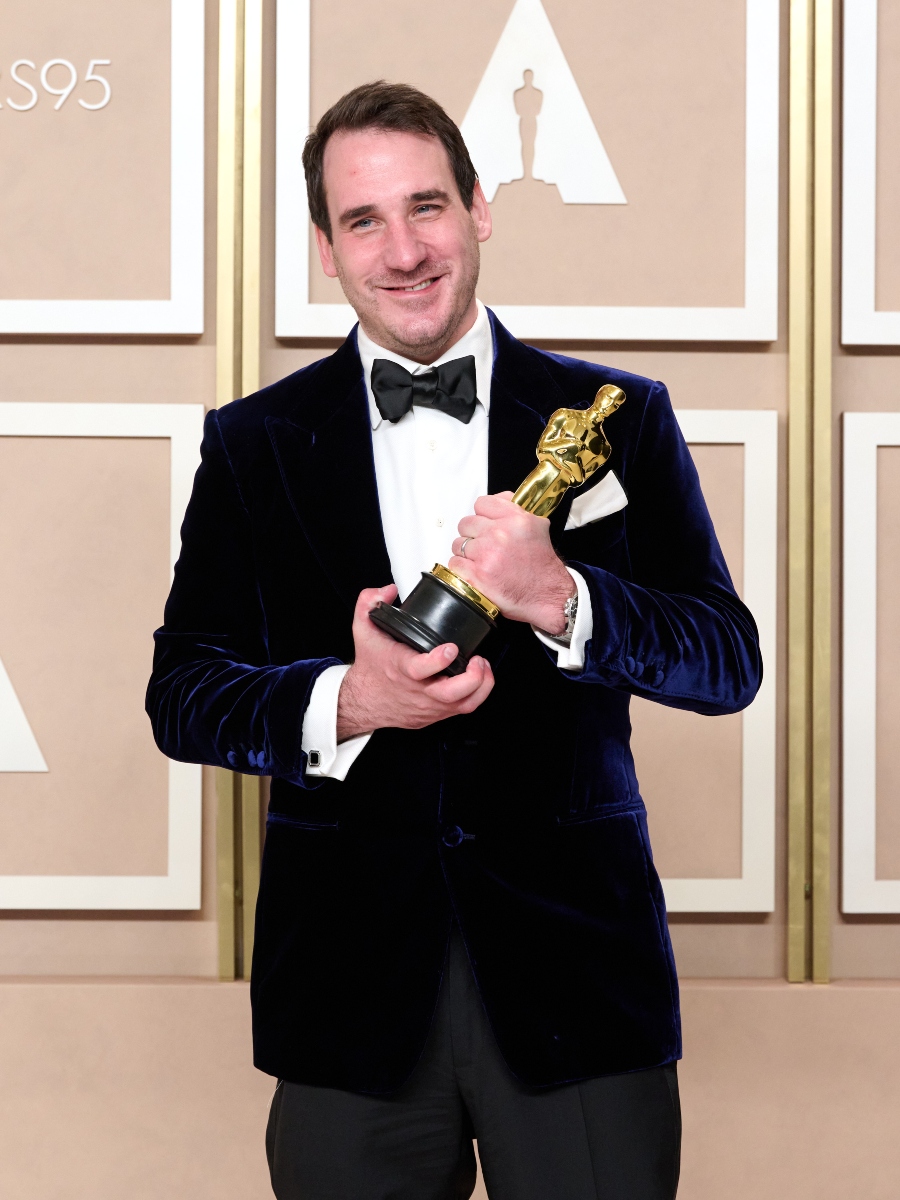
That was, of course, one of the evening’s other big themes, but ironically, those comments came just as, in the front of the house, Elvis Cinematographer Mandy Walker, ASC, ACS came up short in her bid to replicate her ASC win and become the first woman ever to win the Oscar for Best Cinematography, just as she was the first winner in the ASC’s own feature film category.
This is primarily to note the ironic juxtaposition of the timing, and not to say that the visceral work of winning DP James Friend, ASC, BSC, in All Quiet on the Western Front was any less deserving. In some ways, it again called up the recurring futility of trying to come up with an objective “best” when judging art and creativity.
Backstage, despite having already won a BAFTA this season, Friend mentioned he was “a bit overwhelmed, as you can imagine,” and apologized for what he thought was not making much sense, but he echoed the genuine surprise and gratitude that were perhaps even more consistently palpable in the interview room than in years past.
We asked what approach he took on developing a “look” for the movie, since World War I was the least visually documented of the 20th and 21st’s unceasing parade of wars, to which he said the original novel “was everything, to be perfectly honest, and the script — we built it upon that.” But he was also clear that such imagery “should not feel beautiful. It should feel horrific,” mentioning that it wasn’t only a war film but “really, it’s a horror movie, as far as photography is concerned, [though], I think, yeah, we dug up some World War I photographs.” But again, he emphasized they didn’t look at those for the “photochemical aspect,” of recreating a period palette, but rather, for the horror aspect.”
He was, however, quick to praise his other collaborators (and other nominated DPs, like Tár’s Florian Hoffmeister, who’d been a mentor), along with Director Edward Berger and winning Production Designer Christian M. Goldbeck.
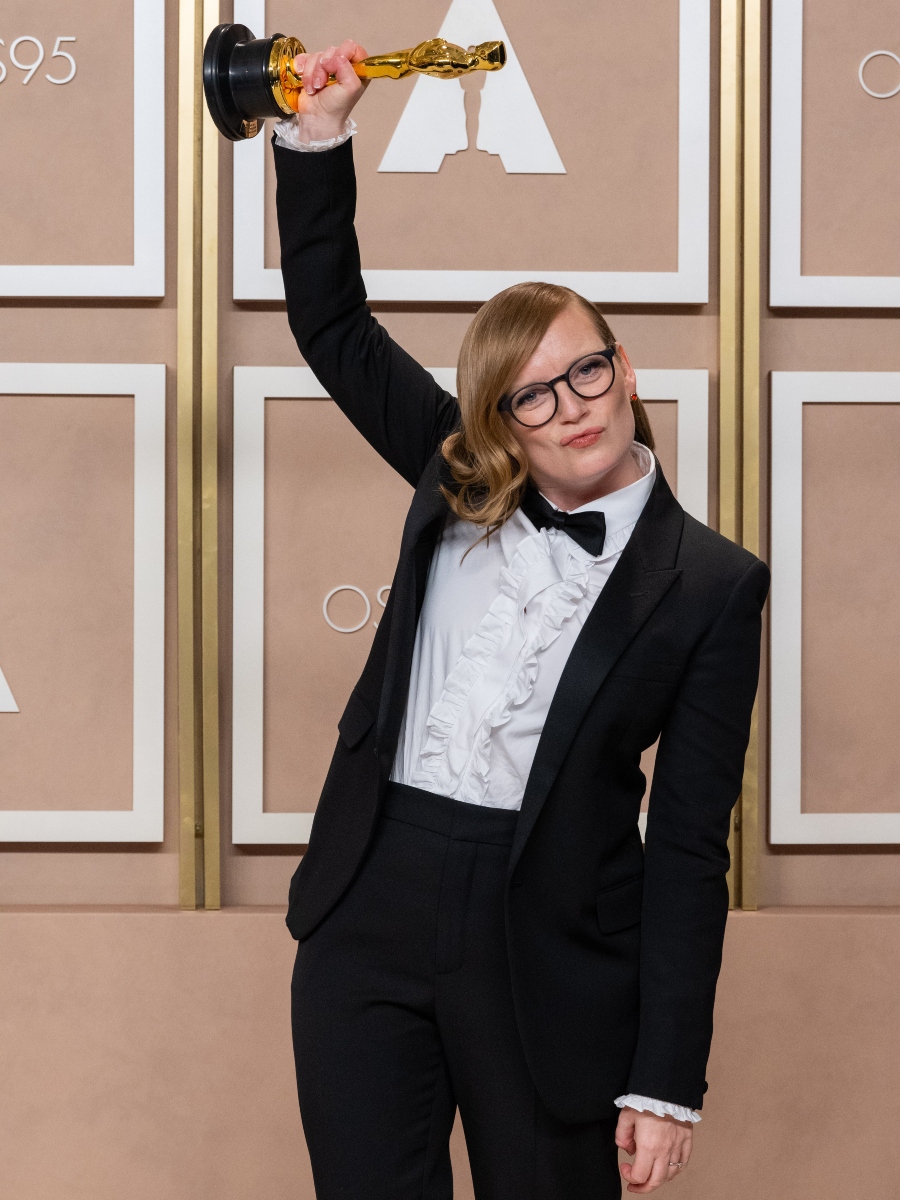
On a similar note, we asked Women Talking’s Writer-Director Sarah Polley, who won that undersung film’s sole Oscar for adapting Miriam Toews‘ original novel, to expand on her crew contributions, which she’d begun to mention in an earlier answer. “I really appreciate the question,” she said, noting that she starts by showing her scripts “at the very very beginning,” to her casting directors, John Buchan and Jason Knight, as well as Luc Montpellier, “my cinematographer, who I’ve worked with since my very first short films, and a lot of people… weighing in very, very early in the process.”
That conversation continued with Producer Dede Gardner and Actress-Producer Frances McDormand, and “extended into the editing room,” where, she said, the film kept evolving since “a lot of crew members, in the moment, would bring their own lived experience into the room, and we would change the script based on it. So it was a very alive, active document that was constantly being collectively built. And I’m sure I’m forgetting a lot of the names of people who contributed right now. But it was not one person.”
Overflowing with even more thanks was the ebullient Ke Huy Quan, who won Best Supporting Actor for his role in trying to keep the timelines together in EEAAO. Quan was so ebullient, in fact, that he even started out with praise for we media minions in the back: “You are the most beautiful looking group of people I have ever seen! Oh my gosh, wow. Can you believe I’m holding one of these? This is so surreal. Wow. So this is the famous room where all the winners come. Wow. Hi! Good Evening!”
Famous or not, Quan spent a few minutes in that room recounting his journey, including the long years away from acting — not by choice — where he’d scramble to take any job on a set. “I’m just so grateful,” he said later, recalling times when he “didn’t think any of this would be possible. And god, it has been so crazy.” And then he said something you don’t often hear during award interviews: “All of a sudden, my mind is drifting back to the days when I lost my health insurance during the pandemic when I couldn’t get a job.”
He brightened and continued that he was going to call his agent the next day, who he’d previously called every few months, inquiring “‘Hey, is there anything out there for me?'”
And the answer would always be the same: ‘Oh, I’m so sorry. There’s nothing out there, but I’ll continue to look.’ So hopefully, when I call my agent tomorrow, he will give me a different answer!”
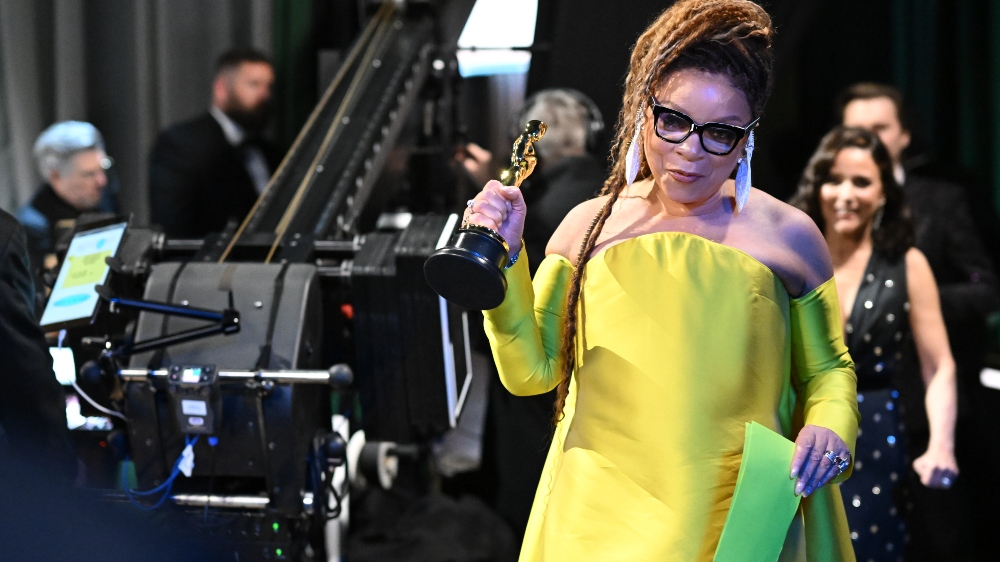
Indeed, one that will allow his guild health insurance plan to just keep rolling along.
But then, when Yeoh was backstage recounting the film’s journey from SXSW, it brought to mind that this year’s edition of that same Texas festival was launching just as Oscar weekend was getting underway.
The music, film, and tech festival – where a lot of startups and venture capital funds also go to court each other — was seemingly hit right in that same spot where Yeoh’s third eye was in the movie, with the news of the sudden collapse of Silicon Valley Bank.
One venture fund CEO said his “group texts with people going to SXSW have turned from what bands they’re excited to see to trying to figure out how to get employees paid next week,” also noting that after the news sank in, there were two camps at SXSW — one “that is very concerned [about] what’s happening, [with] some catching planes to go home, and you have another camp, which is, ‘let’s have a fun time and let’s have some great parties and receptions and enjoy some music and films.'”
Which serves, perhaps, as one of the great thumbnail descriptions of how entertainment is often expected to function — not only in good times but particularly in the bad ones.
As of this writing, banking stocks remain volatile, oil prices have gone lower as a result, and now, Credit Suisse — long rumored to have its own rickety books — is in trouble. The jury remains out on how far this particular “pandemic” is going to spread.
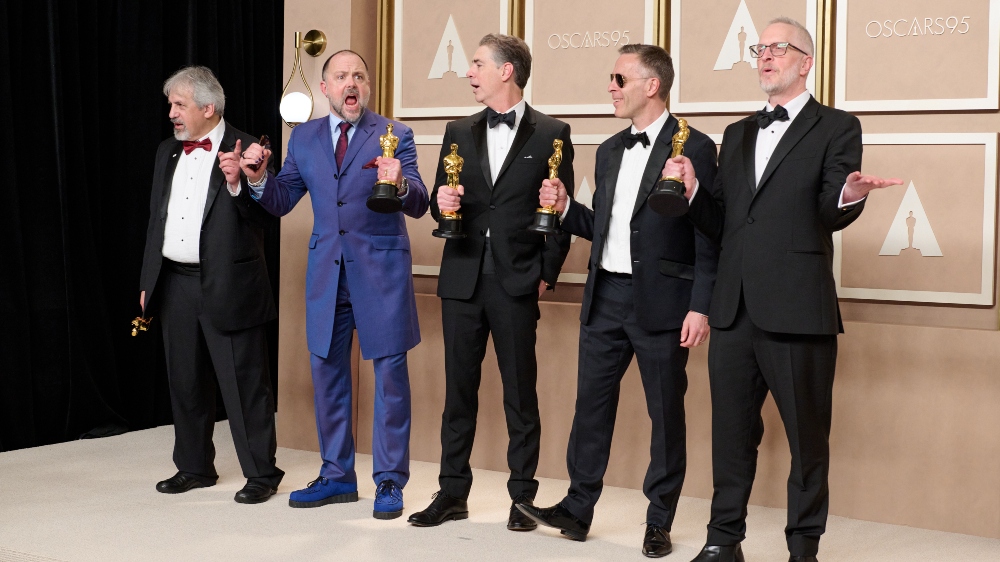
Even Top Gun: Maverick‘s Oscar-winning sound team (that particular blockbuster’s only award of the evening) seemed to sense the tenuousness underneath the insistence that everything, everywhere had returned to “normal,” however that is now defined.
Sound Designer Al Nelson said that “we’re so grateful that sound won an award. So many of the crafts, including the story, including the directing, including what Jerry Bruckheimer put together with Tom Cruise and Chris McQuarrie, deserve amazing credit for making theater cinema something that people wanted to risk [for] and invest in again. We’re so thankful for that.”
It was interesting to couch a formerly routine activity such as going to movies as something that had become, at least for a while, a “risk.” But panics, and contagions of all stripes, can still potentially affect such reinvestments.
Whether people are going back to theaters in their usual pre-viral droves or not, it will still be streaming, and other ongoing shifts in technology, that will inform the season Hollywood finds itself stepping into immediately following Oscar. Which is not, this time, primarily either the anticipation of spring and summer blockbuster releases, or too-early Emmy handicapping.
Instead, of course, it’s the potential for the strike that may come if the Writers Guild and Producers can’t come to terms, setting a template for the DGA and SAG contracts that will expire shortly after. The shape of the overall economy will affect those talks too, as will each side’s stomach for a protracted work shutdown.
Meanwhile, out on Hollywood Boulevard, limos were whisking many of the gilded ones away to parties, while behind the red carpet — which was actually champagne-colored — this year’s set was already being struck. An apt metaphor, indeed.
 Mark London Williams is a BTL alum who currently covers Hollywood, its contents and discontents, in his recurring “Across the Pond” dispatch for British Cinematographer magazine, contributes to other showbiz and production-minded sites, and musters out the occasional zombie, pandemic-themed, or demon-tinged book and script, causing an increased blurring in terms of what still feels like “fiction.”
Mark London Williams is a BTL alum who currently covers Hollywood, its contents and discontents, in his recurring “Across the Pond” dispatch for British Cinematographer magazine, contributes to other showbiz and production-minded sites, and musters out the occasional zombie, pandemic-themed, or demon-tinged book and script, causing an increased blurring in terms of what still feels like “fiction.”
Mark London Williams’ Union Roundup column will appear every Tuesday. You can reach him to give him tips and feedback at [email protected]. He can also be found on Twitter @TricksterInk.





